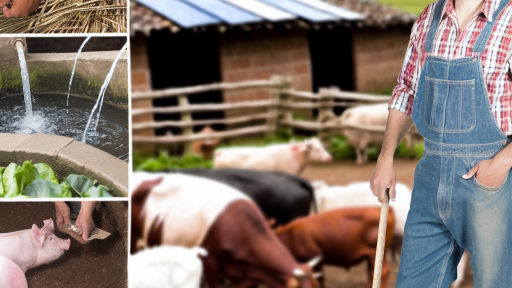Introduction to Direct Farm Sales and Online Platforms
Direct farm sales connect farmers directly with consumers.
This method enables farmers to sell fresh produce effectively.
Online platforms play a crucial role in these sales.
They allow farmers to reach a wider audience than traditional methods.
Consumers today increasingly prefer purchasing directly from producers.
Online platforms facilitate this preference by providing accessibility and convenience.
Moreover, farmers can showcase their unique products online.
This approach not only boosts sales but also enhances brand visibility.
Benefits of Direct Farm Sales
Direct sales can substantially increase farmers’ profit margins.
By skipping intermediaries, farmers retain more profits.
Additionally, farmers gain valuable feedback from their customers.
This feedback can guide future product offerings and improvements.
Furthermore, building direct relationships fosters customer loyalty.
Returning customers provide a stable income stream.
Choosing the Right Online Platforms
Selecting the right online platform is essential for success.
Transform Your Agribusiness
Unlock your farm's potential with expert advice tailored to your needs. Get actionable steps that drive real results.
Get StartedFarmers should consider user-friendly options with strong community engagement.
Platforms like Farmers Market Online and Fresh Farm Connect cater specifically to local food.
Other options include social media platforms such as Instagram and Facebook.
These platforms can help farmers share their stories and products effectively.
Farmers should evaluate fees and features before deciding on a platform.
Effective Marketing Strategies
Marketing plays a significant role in the success of direct farm sales.
Farmers can utilize storytelling to connect with consumers.
Sharing the farm’s journey and values generates consumer interest.
Additionally, high-quality visuals of products attract more buyers.
Email marketing also serves as a powerful tool for engagement.
Building a subscriber list allows for regular updates and promotions.
Offering seasonal discounts can drive sales during peak produce times.
Building Community Support
Community involvement enhances the success of direct farm sales.
Participation in local events, like farmers’ markets, builds a local customer base.
Collaborating with local restaurants and shops can also expand reach.
Furthermore, sharing knowledge through workshops encourages community support.
Community-supported agriculture (CSA) models foster sustained relationships.
These models provide consumers with regular deliveries of farm products.
A strong community presence often leads to increased sales and trust.
Benefits of Using Online Platforms for Farmers
Increased Market Access
Online platforms allow farmers to reach a larger customer base.
This increased visibility leads to more sales opportunities.
Additionally, farmers can target specific demographics effectively.
Cost-Effective Marketing Solutions
Utilizing online platforms often reduces marketing costs.
Farmers can create their own promotional content easily.
Showcase Your Farming Business
Publish your professional farming services profile on our blog for a one-time fee of $200 and reach a dedicated audience of farmers and agribusiness owners.
Publish Your ProfileMoreover, social media provides low-cost advertising options.
Enhanced Customer Interaction
Online platforms facilitate direct communication with customers.
Farmers can respond to questions promptly.
This engagement helps build customer loyalty over time.
Streamlined Sales Processes
Online tools simplify the sales process significantly.
Farmers can manage orders and inventory more efficiently.
Furthermore, electronic payments are increasingly secure and convenient.
Access to Market Data
Farmers benefit from valuable market insights through online platforms.
They can track pricing trends to optimize their pricing strategies.
This data aids in making informed business decisions.
Opportunities for Diversification
Online platforms offer avenues for diversifying product lines.
Farmers can introduce new products to gauge customer interest.
Additionally, they can explore value-added products easily.
Types of Online Platforms Suitable for Direct Sales
E-commerce Websites
E-commerce websites allow farmers to create their own online stores.
Farmers can showcase products directly to consumers.
These platforms often feature user-friendly interfaces.
Examples include Shopify and WooCommerce.
Farmers can integrate payment gateways easily.
Additionally, analytics tools help track customer behavior.
Social Media Platforms
Social media platforms are effective for building brand recognition.
Farmers can directly engage with customers through posts and stories.
Platforms like Instagram and Facebook allow visual product displays.
Farmers can boost sales using targeted advertisements.
Moreover, community groups facilitate local sales.
Marketplaces
Online marketplaces connect farmers with a larger audience.
Examples include Etsy and Amazon Handmade.
These platforms provide built-in traffic and visibility.
Farmers can benefit from established consumer trust.
However, competition may be higher on these sites.
They typically charge a fee for listings and sales.
Community Supported Agriculture (CSA) Platforms
CSA platforms foster relationships between farmers and consumers.
These platforms support subscription models for regular deliveries.
Consumers can sign up for seasonal produce packages.
Farmers can predict income based on subscriptions.
Such platforms promote local agriculture and sustainability.
Direct Messaging and Communication Tools
Using communication tools enhances direct customer engagement.
Platforms like WhatsApp and Telegram allow for quick inquiries.
Farmers can share updates and special offers easily.
These tools create a sense of community around the farm.
Customers appreciate quicker responses to their questions.
Showcase Your Farming Business
Publish your professional farming services profile on our blog for a one-time fee of $200 and reach a dedicated audience of farmers and agribusiness owners.
Publish Your ProfileBuilding relationships leads to customer loyalty.
Delve into the Subject: Implementing Organic Techniques In Modern Farming
Building an Online Store
Choosing the Right Platform
Select an online platform that suits your needs and budget.
Options include Shopify, WooCommerce, or Squarespace.
Each platform has unique features and pricing models.
Consider ease of use and customization options.
Evaluate built-in payment processors and shipping solutions.
Designing Your Store
Create an appealing and user-friendly design for your store.
Use high-quality images to showcase your products.
Ensure the navigation is intuitive and straightforward.
Incorporate a responsive design for mobile users.
Choose colors and typography that reflect your brand identity.
Listing Your Products
Write clear, informative descriptions for each product.
Include key details like size, weight, and ingredients.
Optimize titles and descriptions with relevant keywords.
Utilize tags for easy searching and filtering.
Regularly update your product listings to maintain interest.
Setting Up Payment Options
Select a variety of payment methods to accommodate customers.
Common options include credit cards, PayPal, and Apple Pay.
Ensure all transactions are secure and encrypted.
Clearly communicate any fees associated with payments.
Test the payment process to confirm ease of use.
Implementing Shipping Strategies
Decide on your shipping methods and rates.
Consider offering free shipping for orders over a certain amount.
Choose reliable carriers to ensure timely delivery.
Communicate shipping times and policies clearly on your site.
Allow for tracking options so customers can follow their orders.
Marketing Your Online Store
Develop a marketing strategy to promote your store.
Utilize social media to engage with customers and build a following.
Create email campaigns to advertise new products and sales.
Consider using paid ads to reach a larger audience.
Track your marketing efforts to see what strategies are effective.
Providing Customer Support
Offer various support options such as chat, email, or phone.
Respond promptly to customer inquiries and feedback.
Incorporate an FAQ section to address common issues.
Encourage reviews and respond to them to build trust.
Continuously improve your support based on customer feedback.
Learn More: Connecting Farmers with Local Consumers Effectively
Marketing Strategies to Promote Online Farm Sales
Understanding Your Target Audience
Identifying your target audience is crucial for effective marketing.
Research demographics to understand their preferences.
Showcase Your Farming Business
Publish your professional farming services profile on our blog for a one-time fee of $200 and reach a dedicated audience of farmers and agribusiness owners.
Publish Your ProfileExplore behavioral patterns that influence buying decisions.
Segment your audience for more tailored messaging.
Building an Engaging Online Presence
Create a user-friendly website for your farm’s sales.
Ensure your website is mobile-responsive for accessibility.
Use high-quality images to showcase your products effectively.
Incorporate a blog to share farming tips and stories.
Utilizing Social Media Platforms
Leverage social media to reach a wider audience.
Share engaging content that highlights your farm’s story.
Participate in relevant online communities to connect with potential customers.
Run targeted ads on platforms like Facebook and Instagram.
Implementing Email Marketing
Build an email list by offering valuable resources.
Send regular newsletters with updates and promotions.
Personalize your emails to increase engagement and conversions.
Utilize compelling subject lines to boost open rates.
Offering Promotions and Discounts
Attract customers with limited-time promotions and discounts.
Bundle products for special pricing to encourage larger purchases.
Promote referral programs to incentivize word-of-mouth marketing.
Highlight seasonal sales to create urgency among buyers.
Collaborating with Local Businesses
Partner with local restaurants and cafes to sell your products.
Feature your farm’s goods in local farmers’ markets.
Collaborate with food bloggers for cross-promotion opportunities.
Join community events to showcase your farm’s offerings.
Collecting Customer Feedback
Encourage customers to leave reviews and feedback online.
Utilize surveys to understand customer preferences better.
Act on feedback to improve product offerings and services.
Show appreciation for customer engagement and suggestions.
Uncover the Details: Climate Resilience In Sustainable Agricultural Practices

Engaging with Customers: Building a Community Online
Creating an Online Presence
Farmers can build a robust online presence through social media platforms.
Platforms like Facebook and Instagram allow for direct interaction with customers.
Additionally, maintaining a website enhances credibility and provides essential information.
Consistent posting showcases farm activities, products, and events.
Utilizing Social Media
Social media serves as a powerful tool for community engagement.
Farmers can share behind-the-scenes content to humanize their operations.
This transparency fosters trust and encourages customer loyalty.
Engaging in conversations with followers promotes a sense of belonging.
Polls and questions can also drive interaction and gather feedback.
Creating Valuable Content
Valuable content attracts and retains customers’ attention.
Blogs about farming techniques or recipes using farm products can be effective.
Educational videos or tutorials can enhance customer knowledge and connection.
Sharing success stories or testimonials builds community pride.
Showcase Your Farming Business
Publish your professional farming services profile on our blog for a one-time fee of $200 and reach a dedicated audience of farmers and agribusiness owners.
Publish Your ProfileImplementing Customer Feedback
Customer feedback is crucial for growth and improvement.
Farmers should actively seek input through surveys or comment sections.
Responding to feedback demonstrates respect for customers’ opinions.
This practice creates a cycle of continuous improvement.
Hosting Online Events
Online events can significantly boost community engagement.
Farm virtual tours or workshops to interact directly with customers.
Such events facilitate personal connections and strengthen community ties.
Incentives like discounts can encourage participation and sales.
Building Partnerships
Collaborating with local businesses can expand the community’s reach.
Partnering with restaurants or retailers promotes cross-promotion.
Joint events or campaigns can elevate visibility for all involved.
Community collaboration often leads to increased customer loyalty.
Discover More: How Farms Supply Fresh Produce to Schools
Handling Logistics and Distribution for Online Orders
Efficient Inventory Management
Effective inventory management is crucial for online sales success.
Farmers need to track their stock levels closely.
This helps prevent overselling or running out of products.
Using software solutions can streamline the process.
Additionally, implement regular inventory audits for accuracy.
Selecting the Right Packaging
Choosing appropriate packaging ensures product freshness and safety.
Use eco-friendly materials to appeal to conscious consumers.
Packaging should also be sturdy to withstand shipping conditions.
Clearly label packages to avoid confusion during delivery.
Choosing Reliable Shipping Partners
Finding dependable shipping partners is essential for timely delivery.
Research local logistics companies and their service options.
Consider companies that specialize in perishable goods.
Evaluate their reputation and customer service standards.
Implementing a Clear Shipping Policy
A transparent shipping policy builds customer trust and satisfaction.
Clearly outline shipping costs and times on your website.
Include information about tracking orders for transparency.
Additionally, address return and refund processes upfront.
Utilizing Delivery Technology
Embrace technology to enhance delivery efficiency.
Consider using apps to schedule pickups and deliveries effectively.
Implementing route optimization can save time and costs.
Keep customers informed through automated notifications.
Gathering Customer Feedback
Feedback from customers is invaluable for improving delivery processes.
Encourage reviews and conduct surveys after delivery completion.
Utilize this information to address issues and enhance services.
Continuously seek ways to optimize the customer experience.
Analyzing Sales Data and Customer Feedback for Improvement
Understanding Sales Data
Sales data provides insight into customer preferences.
It reveals trends over time, helping identify popular products.
Showcase Your Farming Business
Publish your professional farming services profile on our blog for a one-time fee of $200 and reach a dedicated audience of farmers and agribusiness owners.
Publish Your ProfileTo maximize profits, focus on items that sell well.
Moreover, analyze seasonal changes in consumer buying habits.
Gathering Customer Feedback
Customer feedback is vital for understanding their needs.
Utilize surveys to collect opinions regularly after purchases.
Additionally, create channels for customers to share reviews.
This can include social media platforms and your website.
Improving Sales Strategies
Use both sales data and feedback to refine your strategies.
Test various marketing approaches based on customer interests.
For example, highlight best-selling items in your promotions.
Track the effectiveness of different promotions over time.
Implementing Changes
Incorporate insights gained from analysis into your business model.
Adjust your inventory based on what customers demand.
Furthermore, revamp your online storefront to enhance user experience.
This can increase customer satisfaction and loyalty.
Monitoring Progress
Continuously monitor sales data and customer feedback.
Adapt your strategies based on what the data shows.
Regularly review performance metrics to ensure success.
This ongoing process leads to sustained growth over time.
Additional Resources
Three Ways Technology is Transforming the Farm to Table Supply …




